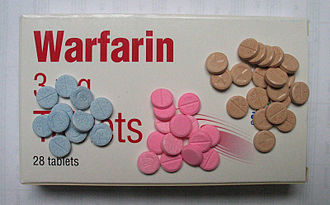Warfarin resistance

Editor-In-Chief: Prab R Tumpati, MD
Obesity, Sleep & Internal medicine
Founder, WikiMD Wellnesspedia &
W8MD medical weight loss NYC and sleep center NYC
| Warfarin resistance | |
|---|---|

| |
| Synonyms | Coumarin resistance |
| Pronounce | N/A |
| Specialty | N/A |
| Symptoms | Thrombosis, embolism |
| Complications | Stroke, myocardial infarction |
| Onset | Varies |
| Duration | Lifelong |
| Types | N/A |
| Causes | Genetic mutations, diet, drug interactions |
| Risks | Family history, certain genetic polymorphisms |
| Diagnosis | Blood tests, genetic testing |
| Differential diagnosis | Vitamin K deficiency, liver disease |
| Prevention | N/A |
| Treatment | Higher doses of warfarin, alternative anticoagulants |
| Medication | Warfarin, heparin, direct oral anticoagulants |
| Prognosis | N/A |
| Frequency | Rare |
| Deaths | Rarely directly causes death, but complications can be fatal |
Warfarin resistance is a rare condition in which people have varying degrees of tolerance to the anticoagulant drug warfarin.

Incidence[edit]
The exact incidence is not known but it is thought to be a very rare disease
Types[edit]
There are two types of warfarin resistance: incomplete and complete. Those with incomplete warfarin resistance can achieve the benefits of warfarin treatment with a high dose of warfarin.
Complete warfarin resistance[edit]
Individuals with complete warfarin resistance do not respond to warfarin treatment, no matter how high the dose. If people with warfarin resistance require anticoagulant therapy and take the average warfarin dose, they will remain at risk of developing a potentially harmful blood clot.

Incomplete warfarin resistance[edit]
In incomplete warfarin resistance, people only respond to high doses of warfarin; in complete warfarin resistance, the drug has no effect. This can be because the drug is metabolized quickly or because the clotting cascade does not interact with warfarin as it should.
Genetics[edit]
One gene that has been identified in warfarin resistance is VKORC1, a gene responsible for warfarin metabolism.
Inheritance[edit]
It is inherited in an autosomal dominant pattern.
Other names[edit]
- Coumarin resistance
- Poor metabolism of coumarin
Latest research[edit]

- Most recent articles
- Ongoing trials
- Possible warfarin resistance due to interaction with ascorbic acid: case report and literature review.'
Sattar A, Willman JE, Kolluri R. Am J Health Syst Pharm. 2013 May 1;70(9):782-6. doi: 10.2146/ajhp110704. PMID: Review. For more than a week, his International Normalized Ratio (INR) values remained below target as the dosage of warfarin was gradually increased to 20 mg daily.
Sinxadi P, Blockman M. Review. Warfarin, the only available oral coumarin anticoagulant in South Africa, is widely prescribed for the prevention and management of arterial and venous thrombo-embolism.
Pest Manag Sci. 2018 Nov;74(11):2555-2560. doi: 10.1002/ps.5040. Epub 2018 Jun 9. Laboratory resistance tests suggested low warfarin resistance frequencies in rats from Zhanjiang (4.9-17.1%) and Harbin (0-2.5%) Cities.
Zhong Nan Da Xue Xue Bao Yi Xue Ban. 2013 Mar;38(3):313-7. doi: 10.3969/j.issn.1672-7347.2013.03.016. Chinese. Once warfarin resistance is diagnosed, the type of resistance should be determined as soon as possible so that treatment could be oriented toward the causes.
Hulse ML. Warfarin resistance may develop as a result of noncompliance, exogenous consumption of vitamin K, and concurrent ingestion of other agents known to decrease warfarin's effects.
|
|
|
| Antithrombotics (thrombolytics, anticoagulants and antiplatelet drugs) (B01) | ||||||||||||||||||||||||
|---|---|---|---|---|---|---|---|---|---|---|---|---|---|---|---|---|---|---|---|---|---|---|---|---|
|
| Pest control: Rodenticides | ||||||||||||||||||||||
|---|---|---|---|---|---|---|---|---|---|---|---|---|---|---|---|---|---|---|---|---|---|---|
|
Ad. Transform your life with W8MD's Budget GLP-1 injections from $75


W8MD offers a medical weight loss program to lose weight in Philadelphia. Our physician-supervised medical weight loss provides:
- Weight loss injections in NYC (generic and brand names):
- Zepbound / Mounjaro, Wegovy / Ozempic, Saxenda
- Most insurances accepted or discounted self-pay rates. We will obtain insurance prior authorizations if needed.
- Generic GLP1 weight loss injections from $75 for the starting dose.
- Also offer prescription weight loss medications including Phentermine, Qsymia, Diethylpropion, Contrave etc.
NYC weight loss doctor appointmentsNYC weight loss doctor appointments
Start your NYC weight loss journey today at our NYC medical weight loss and Philadelphia medical weight loss clinics.
- Call 718-946-5500 to lose weight in NYC or for medical weight loss in Philadelphia 215-676-2334.
- Tags:NYC medical weight loss, Philadelphia lose weight Zepbound NYC, Budget GLP1 weight loss injections, Wegovy Philadelphia, Wegovy NYC, Philadelphia medical weight loss, Brookly weight loss and Wegovy NYC
|
WikiMD's Wellness Encyclopedia |
| Let Food Be Thy Medicine Medicine Thy Food - Hippocrates |
Medical Disclaimer: WikiMD is not a substitute for professional medical advice. The information on WikiMD is provided as an information resource only, may be incorrect, outdated or misleading, and is not to be used or relied on for any diagnostic or treatment purposes. Please consult your health care provider before making any healthcare decisions or for guidance about a specific medical condition. WikiMD expressly disclaims responsibility, and shall have no liability, for any damages, loss, injury, or liability whatsoever suffered as a result of your reliance on the information contained in this site. By visiting this site you agree to the foregoing terms and conditions, which may from time to time be changed or supplemented by WikiMD. If you do not agree to the foregoing terms and conditions, you should not enter or use this site. See full disclaimer.
Credits:Most images are courtesy of Wikimedia commons, and templates, categories Wikipedia, licensed under CC BY SA or similar.
Translate this page: - East Asian
中文,
日本,
한국어,
South Asian
हिन्दी,
தமிழ்,
తెలుగు,
Urdu,
ಕನ್ನಡ,
Southeast Asian
Indonesian,
Vietnamese,
Thai,
မြန်မာဘာသာ,
বাংলা
European
español,
Deutsch,
français,
Greek,
português do Brasil,
polski,
română,
русский,
Nederlands,
norsk,
svenska,
suomi,
Italian
Middle Eastern & African
عربى,
Turkish,
Persian,
Hebrew,
Afrikaans,
isiZulu,
Kiswahili,
Other
Bulgarian,
Hungarian,
Czech,
Swedish,
മലയാളം,
मराठी,
ਪੰਜਾਬੀ,
ગુજરાતી,
Portuguese,
Ukrainian

